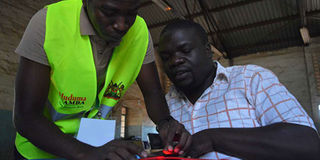Huduma Namba chance to break ground as truly digital country

Piloting of the National Integrated Identity Management System takes place in Kisumu on February 20, 2019. PHOTO | ONDARI OGEGA | NATION MEDIA GROUP
What you need to know:
- The review is meant to respond primarily to the challenge of delivering seamless public services to citizens and residents as well as address crime.
- Having a common system driven by the government would greatly enhance the efficiency of the economy and customer experience across multiple entities.
The piloting of the National Integrated Identity Management System (NIIMS), Huduma Namba, could be a good opportunity to look afresh at merging our national identification databases into a single view.
The review is meant to respond primarily to the challenge of delivering seamless public services to citizens and residents as well as address crime, especially terrorism.
But it will open up incredible opportunities for business and citizens and fuel the ongoing economic transformation.
At the design stage, therefore, Huduma Namba should incorporate the needs of the government, citizens and business for a coherent database that they can use to facilitate business and personal interaction and transactions.
BUSINESS
It is not unusual for our myriad identification databases — including the national identity card (ID) issued at 18, passport, driving licence, National Social Security Fund (NSSF), National Hospital Insurance Fund (NHIF) and Kenya Revenue Authority Personal Identification Number (PIN) — to vary on one person.
These systems, though useful in their own ways, can lead to problems outside their area of use.
Business transactions are very slow due to the need to verify identification of the parties. An innocent error in the spelling of a name can hold up the opening of a bank account.
Even services from government agencies that supposedly own the databases are equally slow.
It takes the police two weeks to issue a clearance certificate! With the proposed use of biometric data, verifying identity can take as short as a few minutes — and cost less.
EFFICIENCY
Today, Safaricom can give their subscribers access to their M-Pesa accounts by voice recognition. Medical insurers use biometric cards to give their customers access to treatment.
Having a common system driven by the government would greatly enhance the efficiency of the economy and customer experience across multiple entities — from the government to business and even churches!
Huduma Namba should, ideally, be linked to the person’s birth registration.
Enhanced by GPS capabilities, there would be no need for regular census and we would generally have very accurate population numbers.
We could continue linking the information collected at different points in life — at birth, allocation of Huduma Namba, during school enrolment, application for a passport, registering a business, paying tax, opening a bank account, hospital admission, retail loyalty cards, insurance and mobile phone number.
MERITS
In the United States and Canada, the Social Security and Social Insurance Numbers (SSN and SIN), respectively, are widely used as a means of identification and, despite their low integrity, provide a basis for data interchange and matching.
In New Zealand, the Wanganui Data Centre operates integrated driver and motor vehicle licensing and police criminal records data.
Proponents of national identification systems suggest these systems as a solution to political and social problems — everything from preventing terrorism to keeping bad drivers off the road, stopping teenagers from drinking, and foiling drug traffickers.
They are also expected to thwart cheats from cashing bad cheques, run background checks on gun purchasers, prohibit criminals or sex offenders from employment, control the spread of diseases and halt illegal immigration.
DATA
Some also point out the convenience factor — one could use the card at the bank, as a driving licence or to be whisked through queues at security checkpoints, including Customs.
Time is ripe for the government to deploy the right information and communication technology to create a central database of all citizens and foreigners.
That way, any cross-checking by public and private users will easily generate the requisite information about any individual in the country.
Lastly, the opportunity to develop the world’s best personal identification system exists for Kenya. Let’s seize the moment and become the ultimate digital country.
Mr Nzuki is a policy adviser at Altima Africa Consulting. [email protected]




